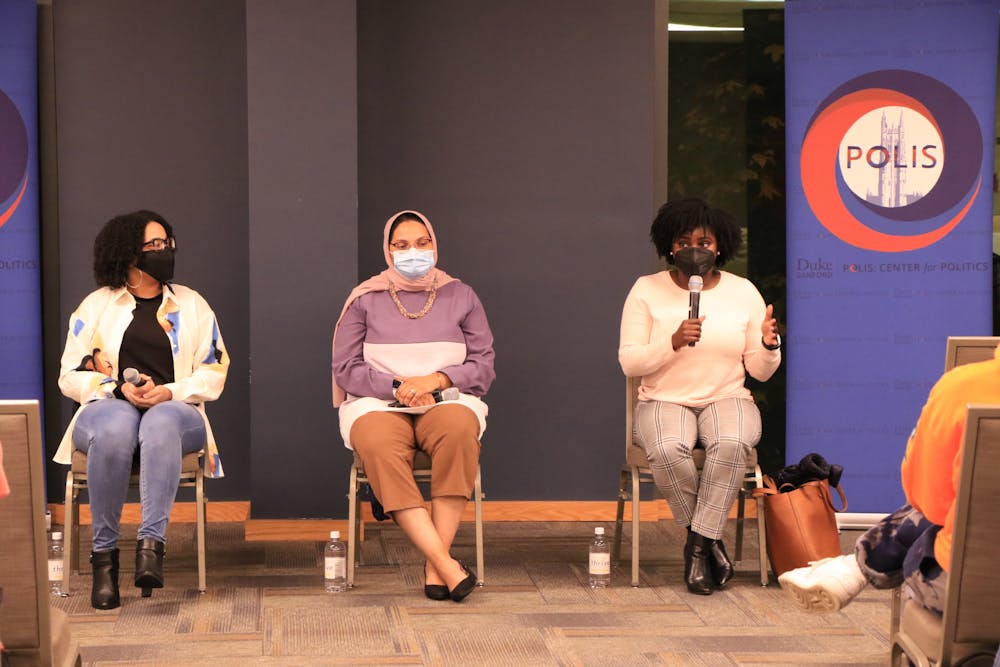Duke’s Polis: Center for Politics invited a small panel of community leaders to highlight the importance of young people in politics Wednesday evening.
The event, which was moderated by Deondra Rose, director of Polis and associate professor of history, political science and public policy, featured a question and answer session with three Durham leaders. The discussion centered on the panelists' work experiences, political interests and advice to students.
The panel included Anjali Boyd, Durham County soil and water conservation district supervisor and a doctoral student at the Nicholas School of the Environment; Bettina Umstead, chair of the Durham Public Schools Board of Education and Durham County Commissioner Nida Allam.
To begin the discussion, Rose asked each speaker to describe their occupation on a day-to-day level.
“Everything from what time school starts to assigning where students go to school,” Umstead said. “This past year, we’ve all been challenged and stretched to think about how we think about public schools differently.”
Allam said that the county gets to work with the board of education a lot.
“Our job as commissioners is looking at what our tax rate for Durham County residents is, and then how to distribute that tax and how to fund different programs and the schools are actually the largest portion of our budget,” Allam said.
“Every county has their own zone district, so it’s a pretty collaborative process between a lot of districts,” Boyd said. “A lot of it is trying to meet new people, understand what their needs are in their county, and how we can be of assistance to them and how they can be of assistance to us.”
The speakers discussed where their interest in politics began.
Umstead claimed that she, “never saw [herself] as a politician.” Allam had also never imagined herself going into politics, though her eyes were opened after tragedy struck just miles down the road.
“We grew up in a family that my parents would always make sure we voted, but we never really talked about politics beyond that,” Allam said. “However, in 2015, I lost my three close friends [Deah Barakat, Yusor Abu-Salha and Razan Abu-Salha] in the Chapel Hill shooting, and that’s what really spurred me to get involved in politics.”
“They saw three brilliant Muslim students that were murdered in a hate crime, but the police and public officials called it a parking dispute,” she continued. “That really made me realize that, you know, when we’re not speaking up for ourselves, other people are going to write their stories for us.”
“If you would’ve talked to me in high school or college, I would’ve been like no, that’s way too far,” Boyd answered. “If you look at our elected officials, especially throughout the state of NC, there’s only about three black women in about 500 seats.”
Rose went on to ask the panelists about what has shaped their work.
Allam had reached out to political organizations related to Senator Bernie Sanders during college and tried to see how she could get involved.
“I was known as the socialist queen of [North Carolina State University] during that time,” she said.
Umstead worked at Student U, a Durham-based organization formed to support students and families going to college.
“If kids are spending kindergarten through the 12th grade in a public school, they should leave ready to change the world,” Umstead said. “Their lives depend on it, their family’s lives depend on it.”
Boyd’s “first dip into politics” came when she ran for leadership positions during her undergraduate years and got involved with tutoring programs for students in poor Florida school districts.
Since this year’s Polis theme is “Discourse for Democracy,” the panelists shared their techniques for engaging in political discussion.
“[The key is] developing a thick skin, and not taking things personally, and that people might not see the same as you but their voices are just the same,” Allam said.
Umstead agreed, emphasizing “truly listening” and collaborating as valuable skills when it comes to political discourse.
“There are times where it's like you're like, already know the answer, but to understand the other person's perspective, where they're coming from, and if there is an opportunity to compromise or work together or like collaborate like you got to listen a little longer,” she said.
Boyd mentioned that she is learning that she’s not passionate about everything, so she can’t please everyone.
“A lot of it is trying to disagree respectfully, and like, how do I say I totally disagree with what you’re saying in a respectful way that’s productive, right?”
Rose’s final request for the speakers was for them to share their tips for pursuing a career in politics or public service.
“I would repeat again to not listen to anyone who tells you to wait your turn,” Allam said.
“Get involved and get connected,” Umstead said. “Get used to hearing your voice and speaking and making decisions and thinking through policy.”
Boyd stressed that prospective officials should first understand where their motivation for running comes from, as public service is ultimately for the people.
Get The Chronicle straight to your inbox
Signup for our weekly newsletter. Cancel at any time.
Gautam Sirdeshmukh is a Trinity senior and a staff reporter for the news department. He was previously the health & science news editor of The Chronicle's 117th volume.
Alison Korn is a Pratt junior and enterprise editor of The Chronicle's 118th volume.

